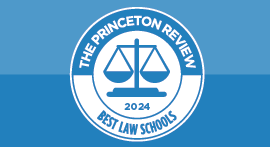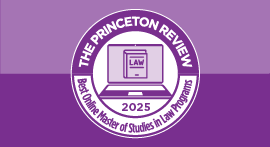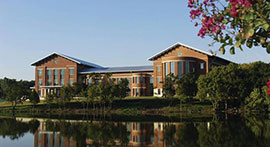Overview
Test Scores
(enrolled students)
Deadlines
Application Process
Other Admission Factors
LSAT Score
Undergraduate GPA
Letters of Recommendation
Essay / Personal Statement
Selectivity Rating
Faculty Information
Students Say
Villanova takes a fairly traditional approach to introductory course work, and students say, “There is still a heavy reliance on the Socratic Method and many classes use a lecture format (especially in the first year).” In the next two years, students continue studying the basic principals of law, while adding elective courses to their schedule. Experiential learning is emphasized throughout the curriculum, and students dole out praise for the school’s strong legal writing and research courses, simulation programs, clinics, and externships. The school has a “clear emphasis” on “solidifying students’ legal writing skills.” In addition, students take on real legal work thanks to the school’s “strong commitment to community service and pro bono work.”
For a Catholic institution, it should come as no surprise that a “Catholic identity” reigns supreme. However, some students wish opportunities for service were not restricted by the administration’s commitment to Catholic values. (“No ‘regular hours’ in the forty-hour work week can be spent helping efforts to litigate for women’s reproductive freedom, and the participating organization must be aware of the policy.”) Ultimately, many wonder “how the administration will balance the school’s Catholic mission with its mission as a legal institution.”
Villanova’s eagerly anticipated, state-of-the-art law school facility opened in August 2009 on a site adjacent to the university’s suburban Philadelphia campus. Law students no longer have cause to bemoan the “severe lack of classrooms, computers, parking spots, hallways, lockers, and space in general” that they complained about in years prior as the new facility offers twice as much space as the old building and a new 500-car parking garage, to boot. While they may complain that the campus has a “high school atmosphere,” students also say they leave Villanova well-prepared for their professional career in the adult world. Students insist that “opportunities for practical experience are abundant,” and the “Career Services Department works really hard to help students find jobs in the private and public sectors.” They note that the school has “strong professional contacts in Pennsylvania, New Jersey, and Delaware” and that “major firms routinely interview on campus and hire many Villanova graduates.”
Career overview
Career Services
Graduates Employed by Area
Graduates Employed by Region
Prominent Alumni
Dates
Expenses per Academic Year
Student Body Profile
Demographics
Campus Life
Students Say
Still, many students choose to maintain a life outside of school, living off-campus with their friends or spouses. Getting to campus is easy since “the train runs literally out the front door of the law school.” One student advises, “there is a bar that students usually hang out at which can be fun, but sometimes after seeing these people all day and every day, it’s good to do something away from the law school crowd.” Luckily, that is easy to accomplish at Villanova thanks to the school’s “amazing” location. One student enthuses, “It is twenty-five minutes from Philadelphia, as well as a short drive to New York City, Washington, D.C., Baltimore, the beaches, and skiing!”
Most students say that they get along with their classmates, though some say the student body is pretty “homogenous” and “not exactly diverse.” However, “Villanova has openly stated that they feel that diversity is a compelling interest at the institution” and many believe that “in time, Villanova will be one of the more diverse legal institutions.”
More Information
Admissions Office Contact
Interim Assistant Dean of Admissions
Villanova, PA 19085



